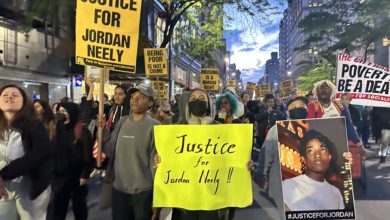A courageous hunger strike by three prisoners at the
Ohio State Penitentiary in Youngstown has led to a significant victory.
The prisoners, three members of the Lucasville Five,
have been held in solitary confinement for over eighteen years due to their
alleged role as leaders of the Lucasville prison uprising in 1993. Despite
overwhelming evidence and the testimony of all members of the Lucasville Five
that they were attempting to negotiate a safe end to the uprising, the Five
have remained on death row for nearly two decades.
The Lucasville uprising in 1993 was sparked by bad
conditions caused by massive prison overcrowding. Prisoners at the time
reported that the warden had removed many educational and recreational programs
from the prison budget. Inmates at the prison were struggling against the
racist criminal justice system that treated them as inhuman.
The uprising lasted 11 days, making it one of the
longest prison uprisings in U.S. history. Seven prisoners and one guard died.
While overwhelming evidence indicates that the Five, who united across the
divide created by racism, were leaders seeking to negotiate an end to the
stalemate and save lives, they were convicted for deaths that occurred during
the uprising.
The three inmates that initiated the hunger strike
are Siddique Abdullah Hasan, who was known as Carlos Sanders in 1993, Bomani
Shakur, formerly known as Keith Lamar and Jason Robb. Of the other two of the
Five, George Skatzes is being held in another prison and Namir Mateen (James
Were) was unable to fast due to diabetes.
The Lucasville prisoners were being treated even
more harshly than other death row residents, forbidden outdoor recreational
activity and all contact with their families. Their solitary confinement
consisted of residing in a solid steel cell for twenty-three hours a day.
After rejecting dozens of meals, the prisoners won
concessions from the prison, including increased family contact and
opportunities. According to the Columbus Dispatch, “Inmates
will be allowed ‘semi-contact’ visits with family members, additional
recreation time, access to computer-based legal research, phone privileges up
to one hour per day and the opportunity to purchase more items from the
commissary, including food and clothing.”
This victory is a testament to the power of
prisoners everywhere. In Ohio, where Blacks and Latinos are being jailed in
record numbers, people everywhere must unite and fight the racist criminal
justice system. Political prisoners sit in prisons and on death row across the
country.
The Lucasville hunger strikers, like the prisoners
who went on strike in prisons across Georgia, have stepped up the struggle at
great risk to themselves. It is the duty of revolutionaries to unite with them
and fight back.





